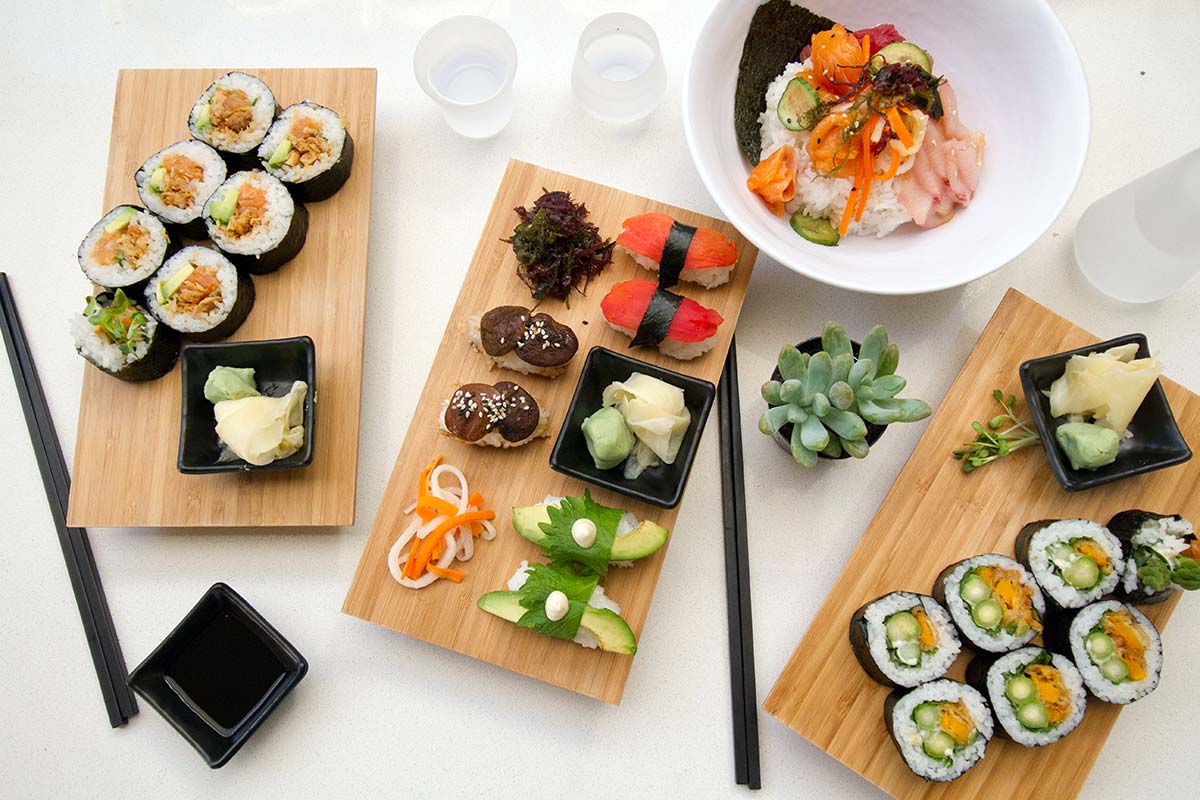Why You Might Be a Vegetarian in 10 years

Which one of these is these is not like the other? Spot the vegetarian set by Blue Window chef Kajsa Alger.
I am not a vegetarian, but in 10 years I might be. If you aren’t already, you might be, too.
In the past decade, chefs have slowly been moving vegetables from side-dish afterthoughts to stylish center-of-the-plate starlets. Acclaimed chef Rene Redzepi was one of the first to elevate vegetables from side dish to superstar at his Copenhagen restaurant Noma (now shuttered), which when it was open was widely recognized as the best restaurant in the world. Last year Vogue asked “Are Vegetables the New Meat?” Plant-focused restaurants like Dirt Candy in New York and Vedge in Philadelphia have received critical acclaim. Chef José Andrés* concentrates on vegetables at Beefsteak, a fast-casual restaurant concept — he calls it “fast-good food” — that’s opened in Washington, D.C., Maryland, and in Philadelphia at the University of Pennsylvania. Lines extend out the door at Sweetgreen, where whole-grain bowls and salads, accompanied by just a little meat, dominate.
Vegetables aren’t just taking over menus, they’re becoming a cultural phenomenon. Remember when beets weren’t cool? Now you can buy a t-shirt that says “Drop the Beet” or “Kale Yeah!” I mean, I’ve always liked beets just fine, but it’s never before occurred to me to use them as a fashion statement. (I did buy someone a “Bacon is a Vegetable” t-shirt once. Maybe a “Kale Yeah!” shirt would absolve me of that crime?)
So why vegetables? And why now?
For me, it’s an interesting question. As a devout omnivore who oversees strategy and purchasing for a $1 billion food service company, I’m particularly interested in trends. It’s clear that for the various culinary innovators leading the charge the motivations may be different, but the direction is the same. For chef Kajsa Alger* of Los Angeles-based Blue Window, whom I heard speak at the Sustainable Foods Institute in Monterey, CA, the choice to make seven of the 11 dishes on her menu meat-free had to do with the overwhelming amount of water required to produce meat. (Los Angeles has faced severe issues with its water supply in recent years.) For José Andrés, the motivation was a belief that fruits and vegetables are the future darlings of the American plate and a desire to get Americans to enjoy them more. He also hopes to connect diners more closely with the farmers who grow their food.
Chefs aren’t the only ones shifting the paradigm. June Jo Lee, formerly of the Hartman Group trend consultancy, says that Generation Z youth (born between 1995 and 2015) care deeply about animal rights, and 1 out of 10 identify as vegetarians — a larger percentage than any previous generation.
I’ve spent much of the last decade working to source meat that’s more humanely raised. At the same time, we’ve also been surreptitiously moving meat away from the center of the plate. It seems like an act of rebellion against animal protein, and I know some ranchers feel up in arms about that decision. But the truth is, if you buy less meat, you can pay more for better quality and for better environmental and husbandry practices.
We saw the vegetable revolution coming, and we opened the gate to let in the wild broccoli stampede.
This year, we surveyed our customers across the country and learned that more than half of them (yes, more than half) identify as vegetarians, flexitarians, or “conscious carnivores.” Meat is no longer the sought-after star of the plate. And even when it is, people are very concerned about where it comes from and how it was raised.
Certainly vegetable-centered dining hasn’t caught on everywhere — there will always be resistance, as the revival of beefsteak banquets and meat-focused restaurants like Butcher Bar and The Cannibal shows — but I think it’s a trend that’s here to stay. It speaks to a diversity of tastes, and care for animals and the environment.
And I, for one, raise my fork in solidarity.
*Disclosure: Bon Appétit Management Company has partnerships with José Andrés and Kajsa Alger at several locations.